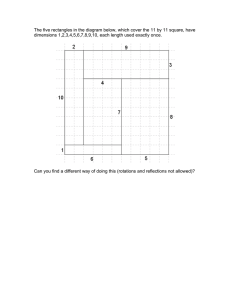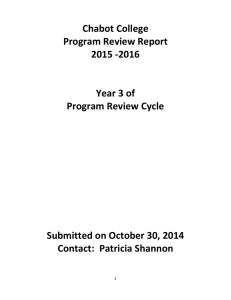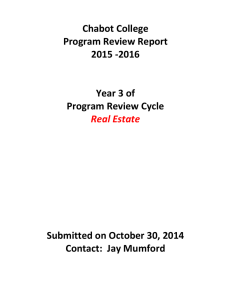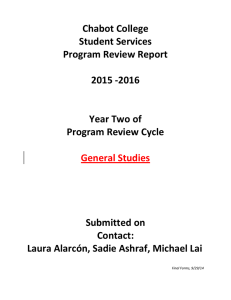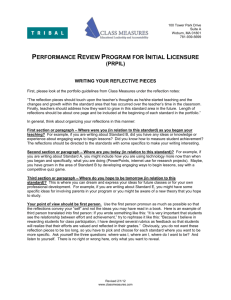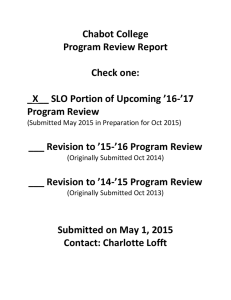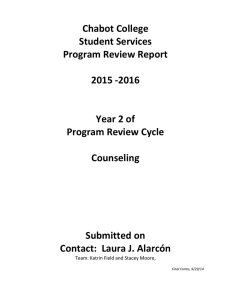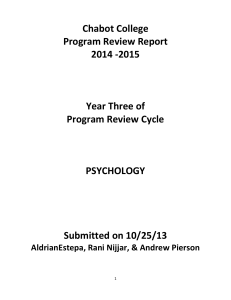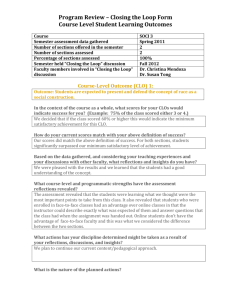Chabot College Program Review Report Check one:
advertisement
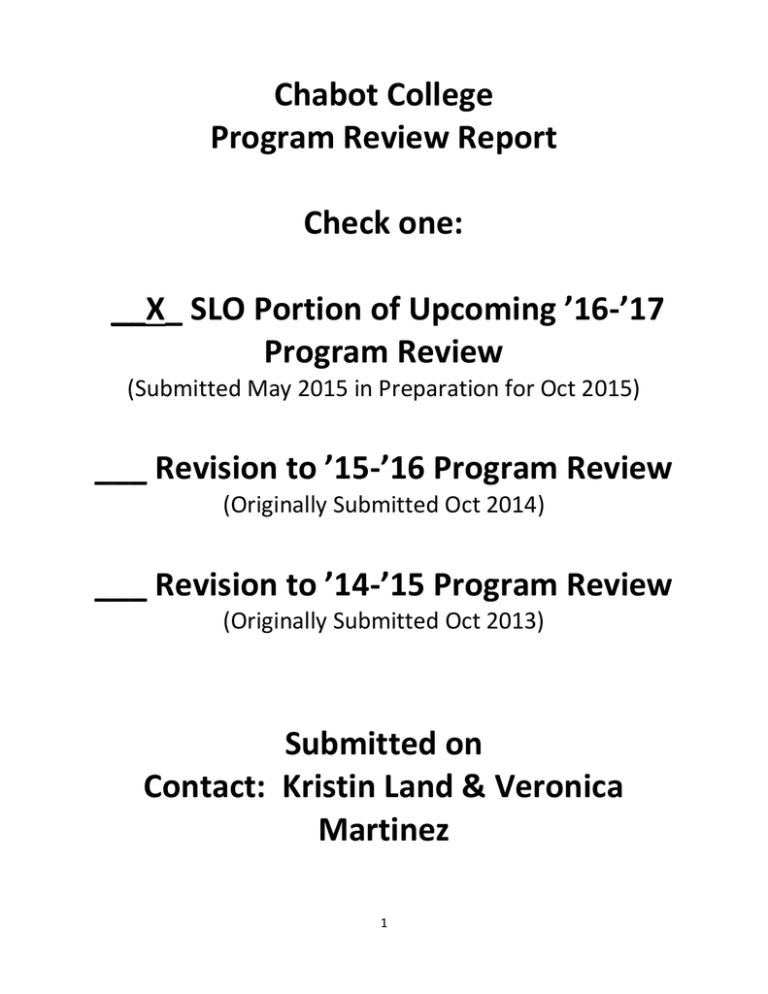
Chabot College Program Review Report Check one: __X_ SLO Portion of Upcoming ’16-’17 Program Review (Submitted May 2015 in Preparation for Oct 2015) ___ Revision to ’15-’16 Program Review (Originally Submitted Oct 2014) ___ Revision to ’14-’15 Program Review (Originally Submitted Oct 2013) Submitted on Contact: Kristin Land & Veronica Martinez 1 2 Appendix B: “Closing the Loop” Course-Level Assessment Reflections. Course Semester assessment data gathered Number of sections offered in the semester Number of sections assessed Percentage of sections assessed Semester held “Closing the Loop” discussion Faculty members involved in “Closing the Loop” discussion SERV 85 A-D Spring 2015 1 1 100% Spring 2015 Veronica Martinez & Kristin Land Form Instructions: Complete a separate Appendix B2 form for each Course-Level assessment reported in this Program Review. These courses should be listed in Appendix B1: Student Learning Outcomes Assessment Reporting Schedule. Part I: CLO Data Reporting. For each CLO, obtain Class Achievement data in aggregate for all sections assessed in eLumen. Part II: CLO Reflections. Based on student success reported in Part I, reflect on the individual CLO. Part III: Course Reflection. In reviewing all the CLOs and your findings, reflect on the course as a whole. PART I: COURSE-LEVEL OUTCOMES – DATA RESULTS CONSIDER THE COURSE-LEVEL OUTCOMES INDIVIDUALLY (THE NUMBER OF CLOS WILL DIFFER BY COURSE) (CLO) 1: Defined Target Scores* (CLO Goal) 70% Actual Scores** (eLumen data) 80% 70% 80% 70% 90% 70% 80% Student should be able to work with a diverse community population (CLO) 2: Student shall be able to build a personal network of community contacts and describe the work of local organizations and/or school programs (CLO) 3: Student should be able to discuss the importance of volunteerism and civic responsibility (CLO) 4: Student should be able to relate their volunteer experience to their own classes and course of study at Chabot 3 PART II: COURSE- LEVEL OUTCOME REFLECTIONS A. COURSE-LEVEL OUTCOME (CLO) 1: 1. How do your current scores match with your above target for student success in this course level outcome? 80% of class scored either a 3 or a 4 so we have met our target. 2. Reflection: Based on the data gathered, and considering your teaching experiences and your discussions with other faculty, what reflections and insights do you have? SERV 85 A- D gives students an opportunity to work with a diverse community population each semester they participate. B. COURSE-LEVEL OUTCOME (CLO) 2: 1. How do your current scores match with your above target for student success in this course level outcome? 80% of class scored either a 3 or a 4, so we are doing very well. 2. Reflection: Based on the data gathered, and considering your teaching experiences and your discussions with other faculty, what reflections and insights do you have? Students in SERV 85 A-D are introduced to community organizations and programs through their volunteering. They describe their organizations in weekly reflections which is why they have been so successful in describing the work of local organizations. 4 C. COURSE-LEVEL OUTCOME (CLO) 3: 1. How do your current scores match with your above target for student success in this course level outcome? 90% of class scored either a 3 or a 4, so we are doing very well 2. Reflection: Based on the data gathered, and considering your teaching experiences and your discussions with other faculty, what reflections and insights do you have? Students in SERV 85 are encouraged to reflect on the importance of volunteerism and civic responsibility in a series of reflection assignments for the course, and they share these reflections with one another which enhances the outcome. D. COURSE-LEVEL OUTCOME (CLO) 4: 1. How do your current scores match with your above target for student success in this course level outcome? 80% of class scored either a 3 or a 4, so we are meeting our goals 2. Reflection: Based on the data gathered, and considering your teaching experiences and your discussions with other faculty, what reflections and insights do you have? Students in SERV 85 are encouraged to connect what they are doing in the community to their larger educational and professional goals in their CAPSTONE reflection and presentations. E. COURSE-LEVEL OUTCOME (CLO) 5: ADD IF NEEDED. 5 PART III: COURSE REFLECTIONS AND FUTURE PLANS 1. What changes were made to your course based on the previous assessment cycle, the prior Closing the Loop reflections and other faculty discussions? Since the last cycle, the presentation and capstone reflection assignments have been added and leveled. The site list for places to volunteer has also been updated and two new instructors have taken on the program without sacrificing the integrity of the curriculum or student success. We will continue to augment the course with an end of the year celebration to honor the students who have given back to the community. 2. Based on the current assessment and reflections, what course-level and programmatic strengths have the assessment reflections revealed? What actions has your discipline determined might be taken as a result of your reflections, discussions, and insights? Serv 85 A-D provides a variety of activities that let students connect current volunteer work with future goals and with being active citizens. Serv 85 A-D does not merely send students out to volunteer, but encourages students to think critically about their volunteer activities and relate them to the “big picture” through many reflective experiences. The course, which is one of a kind at Chabot, helps students get a foothold in volunteering in the East Bay’s diverse multicultural community. We will continue to offer the course once per semester. We will continue to offer a wide variety of volunteer placements in Serv 85 A-D so that students can be paired with opportunities that fit their goals. We will update our site list to better facilitate matches, and we may update our reflections so that there a wider range of topics can be covered between fall and spring semesters, especially given that the course is now leveled and repeatable 4X. 3. What is the nature of the planned actions (please check all that apply)? Curricular X Pedagogical Resource based Change to CLO or rubric Change to assessment methods Other:_________________________________________________________________ 6 Appendix C: Program Learning Outcomes Considering your feedback, findings, and/or information that has arisen from the course level discussions, please reflect on each of your Program Level Outcomes. Program: ______ PLO #1: PLO #2: PLO #3: PLO #4: What questions or investigations arose as a result of these reflections or discussions? What program-level strengths have the assessment reflections revealed? What actions has your discipline determined might be taken to enhance the learning of students completing your program? Program: _____ PLO #1: PLO #2: PLO #3: PLO #4: What questions or investigations arose as a result of these reflections or discussions? 7 What program-level strengths have the assessment reflections revealed? What actions has your discipline determined might be taken to enhance the learning of students completing your program? 8
